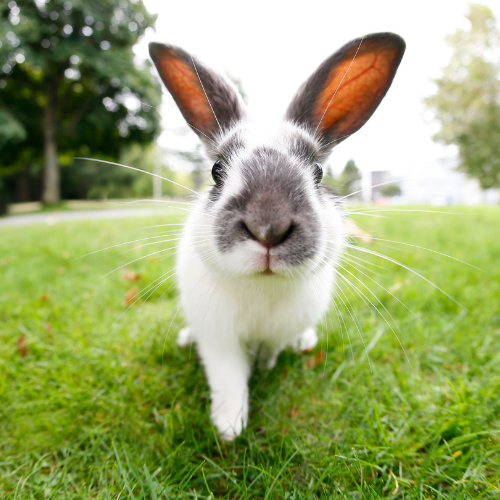September 25th is International Rabbit Day! Bunnies are very cute and fun little pets. However, they have some very different needs than dogs and cats. If you’re adopting your first bunny, you’re in for not only some super cute moments, but also a bit of a learning curve. A local Greater Cincinnati vet lists some key rabbit care tips below.
First things first: your furry pal will need good food, clean water, and a comfy cage. For her diet, Floppy will basically need unlimited grass hay, such as Timothy hay. Commercial food and fresh produce will round out your bunny’s menu. As far as the cage goes, the main thing is to make sure that it’s big enough. Rabbits need lots of room to stand up, stretch out, hop, and contemplate things without tripping over their belongings or hitting the sides or top of their cages. Choose one with a solid bottom: the wire floors can hurt your pet’s paws, and they don’t really hold substrate well. Your vet can give you more specific advice.
Rabbits may be small and cute, but they are also chewing machines. You’ll need to offer Floppy lots of safe, suitable chew toys to nibble on. Many wood, wicker, and cardboard items will work. Ask your vet for more information.
Floppy will need lots of free time out of her cage. Bunnyproofing is a must. This also will protect your belongings. Anything within range of your furry friend’s teeth is fair game. However, some of the key things to address include wires and cords, baseboards and furniture legs, and toxic plants. You’ll also need to seal off openings beneath or behind furniture and cabinets, and keep anything you don’t want your pet chewing on out of reach. Ask your vet for tips.
Bunnies don’t shed continuously, like dogs and cats: they basically explode a few times a year. This is called molting. Floppy will need to be brushed daily during these times.
Just like any other pet, bunnies need to visit their doctors regularly. Your furball should get exams at least once a year. Floppy will also need to be vaccinated for myxomatosis and the R(V)HD – R(V)HD2 viruses. Spay/neuter surgery may also be recommended. Follow your vet’s recommendations.
As your Greater Cincinnati animal clinic, we’re here for you! Please contact us anytime!
